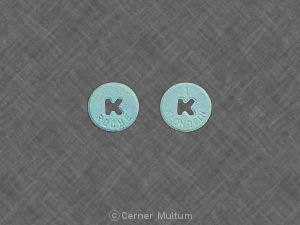Klonopin Dosage
Generic name: CLONAZEPAM 0.5mg
Dosage form: tablets
Drug classes: Benzodiazepine anticonvulsants, Benzodiazepines
Medically reviewed by Drugs.com. Last updated on Dec 7, 2023.
Clonazepam is available as a tablet. The tablets should be administered with water by swallowing the tablet whole.
Seizure Disorders
The use of multiple anticonvulsants may result in an increase of CNS depressant adverse effects. This should be considered before adding Klonopin to an existing anticonvulsant regimen.
Adults
The initial dose for adults with seizure disorders should not exceed 1.5 mg/day divided into three doses. Dosage may be increased in increments of 0.5 to 1 mg every 3 days until seizures are adequately controlled or until side effects preclude any further increase. Maintenance dosage must be individualized for each patient depending upon response. Maximum recommended daily dose is 20 mg.
Pediatric Patients
Klonopin is administered orally. In order to minimize drowsiness, the initial dose for infants and children (up to 10 years of age or 30 kg of body weight) should be between 0.01 and 0.03 mg/kg/day but not to exceed 0.05 mg/kg/day given in two or three divided doses. Dosage should be increased by no more than 0.25 to 0.5 mg every third day until a daily maintenance dose of 0.1 to 0.2 mg/kg of body weight has been reached, unless seizures are controlled or side effects preclude further increase. Whenever possible, the daily dose should be divided into three equal doses. If doses are not equally divided, the largest dose should be given before retiring.
Geriatric Patients
There is no clinical trial experience with Klonopin in seizure disorder patients 65 years of age and older. In general, elderly patients should be started on low doses of Klonopin and observed closely (see PRECAUTIONS: Geriatric Use).
Panic Disorder
Adults
The initial dose for adults with panic disorder is 0.25 mg twice daily. An increase to the target dose for most patients of 1 mg/day may be made after 3 days. The recommended dose of 1 mg/day is based on the results from a fixed dose study in which the optimal effect was seen at 1 mg/day. Higher doses of 2, 3 and 4 mg/day in that study were less effective than the 1 mg/day dose and were associated with more adverse effects. Nevertheless, it is possible that some individual patients may benefit from doses of up to a maximum dose of 4 mg/day, and in those instances, the dose may be increased in increments of 0.125 to 0.25 mg twice daily every 3 days until panic disorder is controlled or until side effects make further increases undesired. To reduce the inconvenience of somnolence, administration of one dose at bedtime may be desirable.
Treatment should be discontinued gradually, with a decrease of 0.125 mg twice daily every 3 days, until the drug is completely withdrawn.
There is no body of evidence available to answer the question of how long the patient treated with clonazepam should remain on it. Therefore, the physician who elects to use Klonopin for extended periods should periodically reevaluate the long-term usefulness of the drug for the individual patient.
Pediatric Patients
There is no clinical trial experience with Klonopin in panic disorder patients under 18 years of age.
Geriatric Patients
There is no clinical trial experience with Klonopin in panic disorder patients 65 years of age and older. In general, elderly patients should be started on low doses of Klonopin and observed closely (see PRECAUTIONS: Geriatric Use).
Discontinuation or Dosage Reduction of KLONOPIN
To reduce the risk of withdrawal reactions, increased seizure frequency, and status epilepticus, use a gradual taper to discontinue Klonopin or reduce the dosage. If a patient develops withdrawal reactions, consider pausing the taper or increasing the dosage to the previous tapered dosage level. Subsequently decrease the dosage more slowly (see WARNINGS: Dependence and Withdrawal Reactions and DRUG ABUSE AND DEPENDENCE: Dependence).
Frequently asked questions
More about Klonopin (clonazepam)
- Check interactions
- Compare alternatives
- Pricing & coupons
- Reviews (744)
- Drug images
- Latest FDA alerts (1)
- Side effects
- Patient tips
- During pregnancy
- Generic availability
- Support group
- Drug class: benzodiazepine anticonvulsants
- Breastfeeding
- En español
Patient resources
Other brands
Professional resources
Related treatment guides
Further information
Always consult your healthcare provider to ensure the information displayed on this page applies to your personal circumstances.


